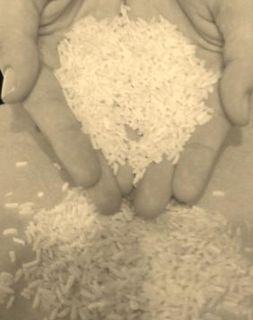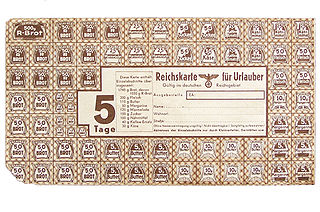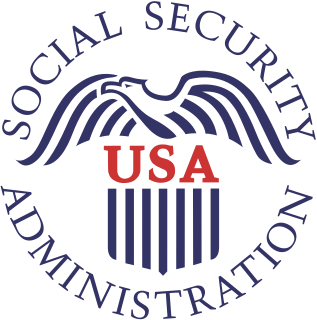Related Research Articles
Stamp or Stamps or Stamping may refer to:

Trading stamps are small paper stamps given to customers by merchants in loyalty programs that predate the modern loyalty card. Like the similarly-issued retailer coupons, these stamps only had a minimal cash value of a few mils individually, but when a customer accumulated a number of them, they could be exchanged with the trading stamp company for premiums, such as toys, personal items, housewares, furniture and appliances.

In the United States, the Supplemental Nutrition Assistance Program (SNAP), formerly known as the Food Stamp Program, is a federal program that provides food-purchasing assistance for low- and no-income people. It is a federal aid program, administered by the United States Department of Agriculture under the Food and Nutrition Service (FNS), though benefits are distributed by specific departments of U.S. states.

Electronic benefit transfer (EBT) is an electronic system that allows state welfare departments to issue benefits via a magnetically encoded payment card used in the United States. It reached nationwide operations in 2004. The average monthly EBT payout is $125 per participant.

A scrip is any substitute for legal tender. It is often a form of credit. Scrips have been created and used for a variety of reasons, including exploitative payment of employees under truck systems; or for use in local commerce at times when regular currency was unavailable, for example in remote coal towns, military bases, ships on long voyages, or occupied countries in wartime. Besides company scrip, other forms of scrip include land scrip, vouchers, token coins such as subway tokens, IOUs, arcade tokens and tickets, and points on some credit cards.

The Food and Nutrition Service (FNS) is an agency of the United States Department of Agriculture (USDA). The FNS is the federal agency responsible for administering the nation’s domestic nutrition assistance programs. The service helps to address the issue of hunger in the United States.
The Special Supplemental Nutrition Program for Women, Infants, and Children (WIC) is a federal assistance program of the Food and Nutrition Service (FNS) of the United States Department of Agriculture (USDA) for healthcare and nutrition of low-income pregnant women, breastfeeding women, and children under the age of five. Their mission is to be a partner with other services that are key to childhood and family well-being. The basic eligibility requirement is a family income below 185% of the federal poverty level. Most states allow automatic income eligibility, where a person or family participating in certain benefits programs, such as the Supplemental Nutrition Assistance Program, Medicaid, or Temporary Assistance for Needy Families, may automatically meet the income eligibility requirements. Currently, WIC serves 53 percent of all infants born in the United States.

Food policy is the area of public policy concerning how food is produced, processed, distributed, purchased, or provided. Food policies are designed to influence the operation of the food and agriculture system balanced with ensuring human health needs. This often includes decision-making around production and processing techniques, marketing, availability, utilization, and consumption of food, in the interest of meeting or furthering social objectives. Food policy can be promulgated on any level, from local to global, and by a government agency, business, or organization. Food policymakers engage in activities such as regulation of food-related industries, establishing eligibility standards for food assistance programs for the poor, ensuring safety of the food supply, food labeling, and even the qualifications of a product to be considered organic.

A ration stamp, ration coupon or ration card is a stamp or card issued by a government to allow the holder to obtain food or other commodities that are in short supply during wartime or in other emergency situations when rationing is in force. Ration stamps were widely used during World War II by both sides after hostilities caused interruption to the normal supply of goods. They were also used after the end of the war while the economies of the belligerents gradually returned to normal. Ration stamps were also used to help maintain the amount of food one could hold at a time. This was so that one person would not have more food than another.
Nutrition Assistance for Puerto Rico (NAP) —Spanish: Programa de Asistencia Nutricional (PAN) popularly known in Puerto Rico as Cupones — is a federal assistance nutritional program provided by the United States Department of Agriculture (USDA) solely to Puerto Rico. In 2021, over $2 billion USD was appropriated as a block grant for NAP to assist over 1 million impoverished residents of Puerto Rico. It is based on, though not part of, the USDA's national Supplemental Nutrition Assistance Program (SNAP) which in 2018 provided $64 billion in nutritional assistance to 42 million people in the 50 U.S. states, D.C., Guam and the US Virgin Islands.

The Susquehanna Art Museum is a non-profit art museum in the United States, located in Midtown Harrisburg, Pennsylvania, the state's capital.
The Inventory Information Approval System, or IIAS, is a point-of-sale technology used by retailers that accept FSA debit cards, which are issued for use with medical flexible spending accounts (FSAs), health reimbursement accounts (HRAs), and some health savings accounts (HSAs) in the United States.
The High School for Enterprise, Business, and Technology is a public high school located on the fourth floor of the Grand Street Educational Campus at 850 Grand Street and Bushwick Avenue in the Williamsburg neighborhood of Brooklyn, New York. The school was opened in the fall of 1996 following the closing of Eastern District High School in the spring of that year. The school observes a student dress code. The principal is Holger Carrillo.

Social programs in the United States are programs designed to ensure that the basic needs of the American population are met. Federal and state social programs include cash assistance, health insurance, food assistance, housing subsidies, energy and utilities subsidies, and education and childcare assistance. Similar benefits are sometimes provided by the private sector either through policy mandates or on a voluntary basis. Employer-sponsored health insurance is an example of this.

The United States Postal Savings System was a postal savings system signed into law by President William Howard Taft and operated by the United States Post Office Department, predecessor of the United States Postal Service, from January 1, 1911, until July 1, 1967.

The Indian food security system was established by the Government of India under the Ministry of Consumer Affairs, Food and Public Distribution to distribute food and non-food items to India's poor at subsidised rates. Major commodities distributed include staple food grains, such as wheat, rice, sugar and essential fuels like kerosene, through a network of fair price shops established in several states across the country. Food Corporation of India, a government-owned corporation, procures and maintains the public distribution system (PDS).
"My EBT" is a hip-hop song performed by Stanley Lafleur under the alias "Mr. EBT". The song laments what can be done with an Electronic Benefit Transfer card

Hunger in the United States of America affects millions of Americans, including some who are middle class, or who are in households where all adults are in work. The United States produces far more food than it needs for domestic consumption—hunger within the U.S. is caused by some Americans having insufficient money to buy food for themselves or their families. Additional causes of hunger and food insecurity include neighborhood deprivation and agricultural policy. Hunger is addressed by a mix of public and private food aid provision. Public interventions include changes to agricultural policy, the construction of supermarkets in underserved neighborhoods, investment in transportation infrastructure, and the development of community gardens. Private aid is provided by food pantries, soup kitchens, food banks, and food rescue organizations.

CalFresh is the California implementation of the federal Supplemental Nutrition Assistance Program (SNAP), formerly known as the Food Stamp program, which provides financial assistance for purchasing food to low-income California residents.
References
- ↑ EBT History Page Archived 2007-10-26 at the Wayback Machine